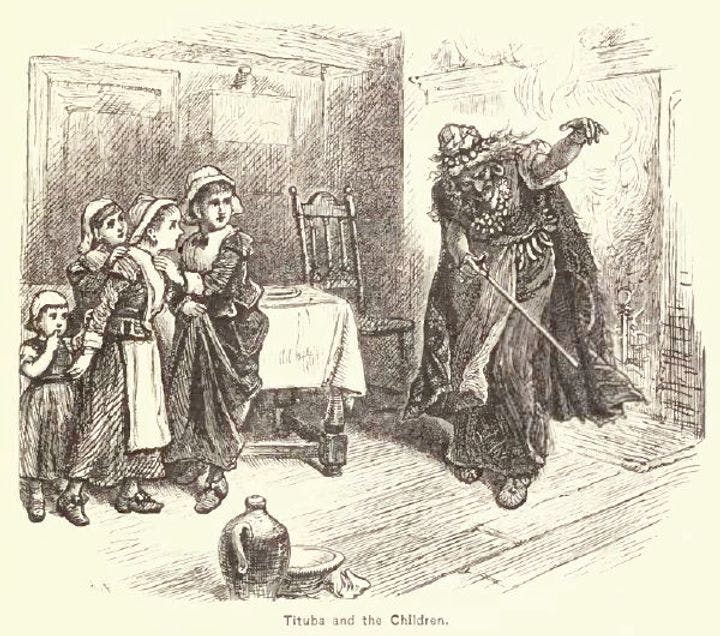Winter 2009
Broomsticks and Politics
– A. J. Loftin
A. J. Loftin reviews a history of witch-hunting, concluding that "If witches existed, John Demos would have found them."
If witches existed, John Demos would have found them.
He has been hunting them for the better part of five decades, first as a graduate student at the University of California, Berkeley, and at Harvard in the 1960s, then as a professor of early American history at Yale. In 1982 Demos published a long scholarly book, Entertaining Satan: Witchcraft and the Culture of Early New England, intended to be his last word on the subject. Yet he could hardly refuse the talk-show invitations that came every Halloween, nor those 3 am calls from people fearing demonic possession. So when editors at Viking asked him to write another book on witch-hunting, this time aimed at a general readership, Demos took the bait.
The result is a text of admirable if breakneck concision, slowed only by the gratuitous insertion of italics in certain sections (as if to warn: scholarly analysis ahead) and clunky headings such as “Mentality. How did witchcraft reflect, and contribute to, the prevailing worldview of its time?” Demos briefly considers the early Christian martyrs, tortured and killed by their countrymen, then races through the next 1,500 years of witch-hunting in Europe, only slowing down when he revisits his area of expertise, colonial America. He reviews the last three decades of Salem witch trials scholarship, which has tried to explain the bizarre behaviors of accused and accuser by looking to science and medicine: Poisoning by ergot (a fungus hosted by cereal grains) could have caused hallucinations in the accused; epidemic encephalitis might have caused convulsions and other symptoms in the “victims.” But mostly such theories have failed the test of time, Demos says. He speculates instead that economic and religious challenges to the Puritan way of life, combined with the constant threat of Indian warfare, created “an overwhelming and highly toxic climate of fear.”
At last Demos ventures somewhat timidly into more recent centuries, to discuss the Chicago union-organized Haymarket riots of 1886, the “Red Scare”–era of Joseph McCarthy in the 1950s, and the daycare “abuse” cases of the last 30 years. He zooms in on the sensational Fells Acres Day School case of the mid-1980s, in which child-care providers in Malden, Massachusetts, were accused and ultimately convicted of sexually abusing their young charges, though many believed they were innocent. “Malden to Salem is barely a dozen miles,” Demos observes, as he considers the characteristics common to both witch hunts: “A panic atmosphere builds. . . . A sense of the demonic . . . serves as the animating core. The judicial system is immediately and fully engaged. . . . Intense, prolonged interrogation assumes central importance. . . . Legal and moral precedents are tossed aside. . . . Children are centrally positioned [to] play a role that has, in effect, been assigned them by their elders.” He concludes: “And now I believe that I truly have said my last word on witchcraft history.”
Certainly Demos is entitled to stop writing about witchcraft. But this book, far from putting the matter to rest, simply invites more speculation. In treating modern instances, Demos repeatedly asks, “Was it a witch-hunt?” bringing the intellectual scruples and caution of a scholar to bear on his answer. But a general reader doesn’t need to be convinced. Hell, yeah—close enough. What we want to know is why we are still hunting for witches, whether at daycare centers or union meetings or mosques. Why, given all our liberal education and supposed psychological literacy, do we continue to project our fears onto other people? If we can’t help ourselves, can’t some safeguards be put into place to protect society’s scapegoats? Or does society need the ritual—the threat, the war on terror, the bloody retribution and fleeting absolution?
A much scarier book could have been written—a book only a witch might enjoy.
* * *
A.J. Loftin is a writer and editor living in Chapel Hill, North Carolina.
Reviewed: The Enemy Within: 2,000 Years of Witch-Hunting in the Western World by John Demos, Viking, 318 pp, 2008.
Cover photo courtesy of Wikimedia Commons
